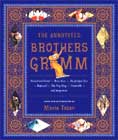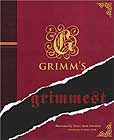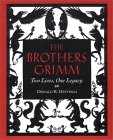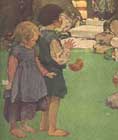
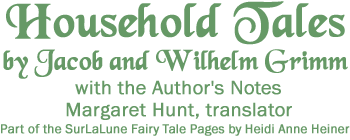
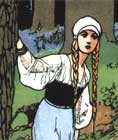
Author's Notes
translated by Margaret Hunt
Return
to
Household Tales:
Table of Contents
SurLaLune Fairy Tales Main Page
King
Thrushbeard
A KING had a daughter who was beautiful
beyond all measure, but so proud and haughty withal that no suitor was
good enough for her. She sent away one after the other, and ridiculed
them as well.
Once the King made a great feast and invited thereto, from far and near, all the young men likely to marry. They were all marshalled in a row according to their rank and standing; first came the kings, then the grand-dukes, then the princes, the earls, the barons, and the gentry. Then the King's daughter was led through the ranks, but to every one she had some objection to make; one was too fat, "The wine-cask," she said. Another was too tall, "Long and thin has little in." The third was too short, "Short and thick is never quick." The fourth was too pale, "As pale as death." The fifth too red, "A fighting-cock." The sixth was not straight enough, "A green log dried behind the stove."
So she had something to say against every one, but she made herself especially merry over a good king who stood quite high up in the row, and whose chin had grown a little crooked. "Well," she cried and laughed, "he has a chin like a thrush's beak!" and from that time he got the name of King Thrushbeard.
But the old King, when he saw that his daugher did nothing but mock the people, and despised all the suitors who were gathered there, was very angry, and swore that she should have for her husband the very first beggar that came to his doors.
A few days afterwards a fiddler came and sang beneath the windows, trying to earn a small alms. When the King heard him he said, "Let him come up." So the fiddler came in, in his dirty, ragged clothes, and sang before the King and his daughter, and when he had ended he asked for a trifling gift. The King said, "Your song has pleased me so well that I will give you my daughter there, to wife."
The King's daughter shuddered, but the King said, "I have taken an oath to give you to the very first beggar-man, and I will keep it." All she could say was in vain; the priest was brought, and she had to let herself be wedded to the fiddler on the spot. When that was done the King said, "Now it is not proper for you, a beggar-woman, to stay any longer in my palace, you may just go away with your husband."
The beggar-man led her out by the hand, and she was obliged to walk away on foot with him. When they came to a large forest she asked, "To whom does that beautiful forest belong?" "It belongs to King Thrushbeard; if you had taken him, it would have been yours." "Ah, unhappy girl that I am, if I had but taken King Thrushbeard!"
Afterwards they came to a meadow, and she asked again, "To whom does this beautiful green meadow belong?" "It belongs to King Thrushbeard; if you had taken him, it would have been yours." "Ah, unhappy girl that I am, if I had but taken King Thrushbeard!"
Then they came to a large town, and she asked again, "To whom does this fine large town belong?" "It belongs to King Thrushbeard; if you had taken him, it would have been yours." "Ah, unhappy girl that I am, if I had but taken King Thrushbeard!"
"It does not please me," said the fiddler, "to hear you always wishing for another husband; am I not good enough for you?" At last they came to a very little hut, and she said, "Oh goodness! what a small house; to whom does this miserable, mean hovel belong?" The fiddler answered, "That is my house and yours, where we shall live together."
She had to stoop in order to go in at the low door. "Where are the servants?" said the King's daughter. "What servants?" answered the beggar-man; "you must yourself do what you wish to have done. Just make a fire at once, and set on water to cook my supper, I am quite tired." But the King's daughter knew nothing about lighting fires or cooking, and the beggar-man had to lend a hand himself to get anything fairly done. When they had finished their scanty meal they went to bed; but he forced her to get up quite early in the morning in order to look after the house.
For a few days they lived in this way as well as might be, and came to the end of all their provisions. Then the man said, "Wife, we cannot go on any longer eating and drinking here and earning nothing. You weave baskets." He went out, cut some willows, and brought them home. Then she began to weave, but the tough willows wounded her delicate hands.
"I see that this will not do," said the man; "you had better spin, perhaps you can do that better." She sat down and tried to spin, but the hard thread soon cut her soft fingers so that the blood ran down. "See," said the man, "you are fit for no sort of work; I have made a bad bargain with you. Now I will try to make a business with pots and earthenware; you must sit in the market-place and sell the ware." "Alas," thought she, "if any of the people from my father's kingdom come to the market and see me sitting there, selling, how they will mock me?" But it was of no use, she had to yield unless she chose to die of hunger.
For the first time she succeeded well, for the people were glad to buy the woman's wares because she was good-looking, and they paid her what she asked; many even gave her the money and left the pots with her as well. So they lived on what she had earned as long as it lasted, then the husband bought a lot of new crockery. With this she sat down at the corner of the market-place, and set it out round about her ready for sale. But suddenly there came a drunken hussar galloping along, and he rode right amongst the pots so that they were all broken into a thousand bits. She began to weep, and did now know what to do for fear. "Alas! what will happen to me?" cried she; "what will my husband say to this?"
She ran home and told him of the misfortune. "Who would seat herself at a corner of the market-place with crockery?" said the man; "leave off crying, I see very well that you cannot do any ordinary work, so I have been to our King's palace and have asked whether they cannot find a place for a kitchen-maid, and they have promised me to take you; in that way you will get your food for nothing."
The King's daughter was now a kitchen-maid, and had to be at the cook's beck and call, and do the dirtiest work. In both her pockets she fastened a little jar, in which she took home her share of the leavings, and upon this they lived.
It happened that the wedding of the King's eldest son was to be celebrated, so the poor woman went up and placed herself by the door of the hall to look on. When all the candles were lit, and people, each more beautiful than the other, entered, and all was full of pomp and splendour, she thought of her lot with a sad heart, and cursed the pride and haughtiness which had humbled her and brought her to so great poverty.
The smell of the delicious dishes which were being taken in and out reached her, and now and then the servants threw her a few morsels of them: these she put in her jars to take home.
All at once the King's son entered, clothed in velvet and silk, with gold chains about his neck. And when he saw the beautiful woman standing by the door he seized her by the hand, and would have danced with her; but she refused and shrank with fear, for she saw that it was King Thrushbeard, her suitor whom she had driven away with scorn. Her struggles were of no avail, he drew her into the hall; but the string by which her pockets were hung broke, the pots fell down, the soup ran out, and the scraps were scattered all about. And when the people saw it, there arose general laughter and derision, and she was so ashamed that she would rather have been a thousand fathoms below the ground. She sprang to the door and would have run away, but on the stairs a man caught her and brought her back; and when she looked at him it was King Thrushbeard again. He said to her kindly, "Do not be afraid, I and the fiddler who has been living with you in that wretched hovel are one. For love of you I disguised myself so; and I also was the hussar who rode through your crockery. This was all done to humble your proud spirit, and to punish you for the insolence with which you mocked me."
Then she wept bitterly and said, "I have done great
wrong, and am not worthy to be your wife." But he said, "Be
comforted, the evil days are past; now we will celebrate our wedding."
Then the maids-in-waiting came and put on her the most splendid clothing,
and her father and his whole court came and wished her happiness in her
marriage with King Thrushbeard, and the joy now began in earnest. I wish
you and I had been there too.
Grimm, Jacob and Wilhelm. Household Tales. Margaret Hunt, translator. London: George Bell, 1884, 1892. 2 volumes.
Notes
From three stories current in Hesse and the districts of the Maine and Paderborn. The last has a different beginning. There is nothing in it about the King's forcing his proud daughter to marry the first corner. A handsome musician, however, comes beneath the King's window. The King summons him upstairs, and his song pleases both the King and his daughter. The musician stays a long time at court, and lives opposite the beautiful maiden, so that he can look in at her window and she into his. Once she sees him touching a little golden wheel with his fingers whereupon beautiful sounds proceed from it; so when he comes again, she entreats him to bring the little golden wheel to her, and he has to show her how to play upon it. She learns, and asks her father to give her also such an instrument. All the goldsmiths in the kingdom are summoned together, but not one of them is able to make it. Thereupon the King's daughter is very sad; and when the musician is aware of that, he says that if she is inclined to marry him he will give her the ingenious bit of work, but she disdainfully refuses. After a while she sees from her window the musician turning a little reel; and while he is doing it the most delightful tones resound; she wants to see it, and asks to have one like it; but the goldsmiths are still less able to produce such a skilful piece of workmanship. And now the handsome musician offers her the little wheel and the reel if she will marry him, and, as her longing for both is so great, she says, yes. Soon, however, repentance comes, and her pride lets her have no rest. She wants to retract her promise, but the King forces her to keep it, and the wedding is celebrated. Then the musician conducts her to the wretched hut in the forest. The rest of the story agrees with ours, and makes it more complete. At the ball when the pan with the food falls down on the ground, she faints with terror. When she awakes, she is lying in a magnificent bed, and the handsome musician is a king. A fourth story has the following peculiarity. The King's daughter made it known that she would give her hand to him who could guess to what species of animal a skin which was stretched out with neither a head nor feet, belonged. It was that of a she-wolf. Thrushbeard learnt the secret, guessed wrongly with great persistence, and then came back disguised as a beggar to guess rightly. Compare No 2. in Pröhle's Kindermärchen. Also (4. 10) in the Pentamerone, Pride punished; in Norwegian, Hakon Borkenbart, Asbjörnsen, part 2.
Thrushbeard (Drosselbart) is also called "Crumb-beard" (Brösulbart), because the crumbs of bread remain sticking in his beard. A "Brochselhart" appears in a song of Nithard (Benecke's Beiträge, p. 291); perhaps it is Brochselbart. The two names are indeed almost convertible, for in Ulfilas a crumb is called drauhsna; we may however also derive Drosselbart from Drossel, Drüssel, Rüssel (snout), mouth, nose, or beak, which also would suit the story.
©Heidi
Anne Heiner, SurLaLune Fairy Tales
E-mail: surlalune@aol.com
Page last updated October 15, 2006
www.surlalunefairytales.com




